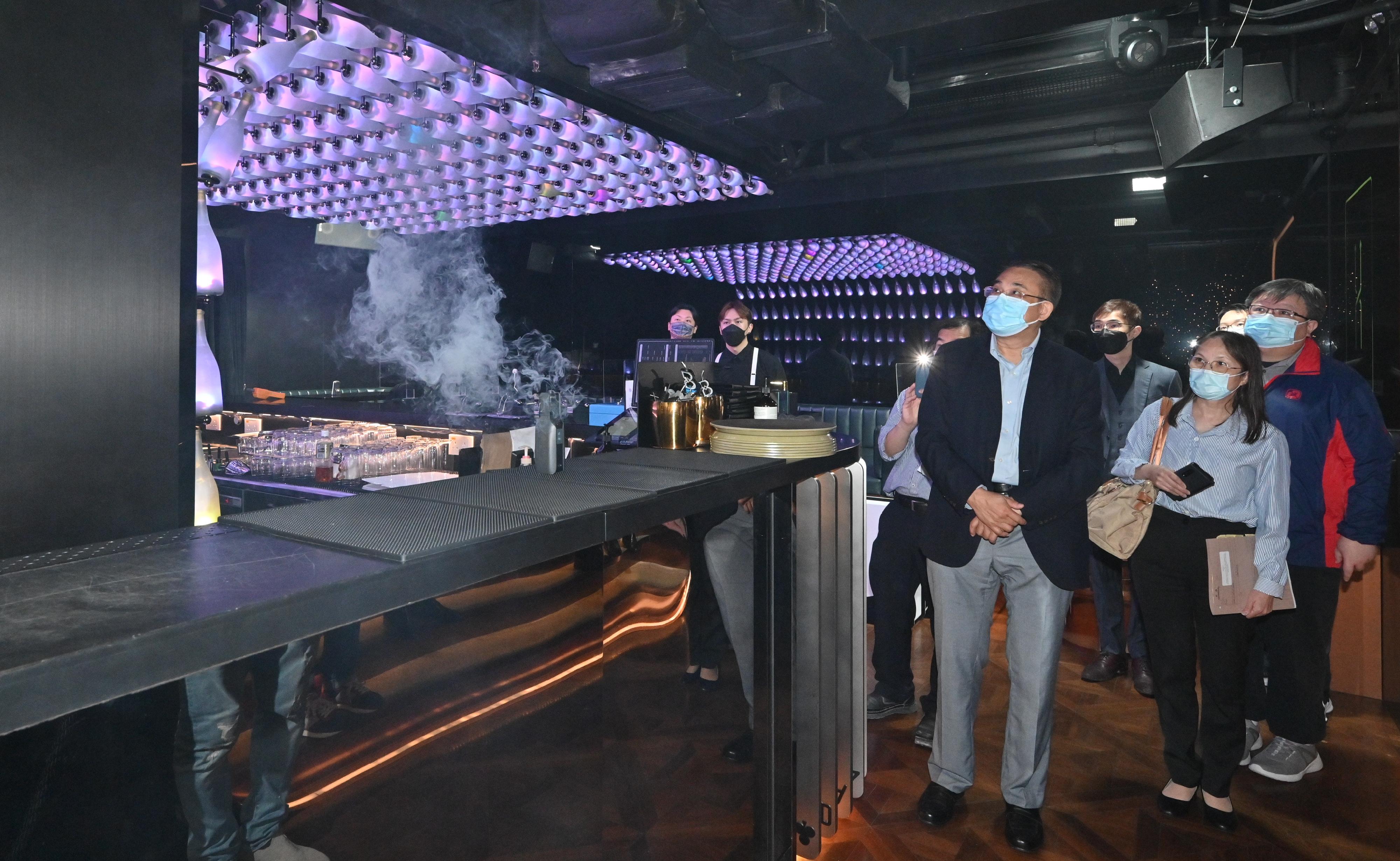Working Group on air change or air purifiers in catering premises inspects catering premises with clusters of infection cases (with photos/video)
The then Secretary for Food and Health stipulated in March last year a requirement on air change or air purifiers to be complied with by dine-in catering premises in the directions in relation to catering business under the Prevention and Control of Disease (Requirements and Directions) (Business and Premises) Regulation (Cap. 599F). The Working Group established for the smooth implementation of the requirement, together with representatives of the Food and Environmental Hygiene Department (FEHD) and the Electrical and Mechanical Services Department, earlier inspected a Tuen Mun restaurant and a Central bar where clusters of infection cases had previously emerged, so as to acquire an understanding of the improvement measures made in relation to their ventilation systems by the qualified ventilation contractors engaged by the premises operators after the incidents.
The Chairman of the Working Group, Professor Yuen Pak-leung, said, "The ventilation requirement pursuant to the directions under Cap. 599F has entered another stage at the end of February this year after about a year of implementation, that is, if the registration on the designated website of the FEHD has not been completed on or before February 24 this year registering that the air change per hour of the premises has reached at least six times per hour or information on installation of air purifiers meeting the specified specifications, the relevant catering premises must be closed until the relevant registration has been completed and the FEHD has confirmed that the registration is valid.
"Over almost a year and a half, the FEHD and the Working Group have, on numerous occasions, given advice and reminders, and provided technical guidance to operators of catering premises. They must ensure that their fresh air related ventilation system and air purifiers must be properly switched on, operated, repaired and maintained on an ongoing basis while the premises are opened for business. Premises operators contravening the directions have to shoulder criminal liability and their premises are also subject to corresponding measures for reducing the risk of transmission, i.e. on the subsequent day of being identified of the irregularities by the enforcement officers, ceasing dine-in operation from 6pm to 4.59am of the subsequent day and restricting the number of persons per table to no more than two, for a period of 14 days. Government departments and the Working Group will continue to keep in view the epidemic development, the requirements specific to indoor ventilation during the epidemic period in various jurisdictions and the advice of the epidemiology experts, with a view to giving consideration and/or putting forward corresponding advice," Professor Yuen added.
During the inspection, the operators of the premises told the Working Group that apart from the cleaning and disinfection of the premises completed at the early stage, a series of repair works had also been carried out by their ventilation contractors for the ventilation system of the premises to improve the ventilation situation and air balancing, thereby reducing the risk of virus transmission. They will also strictly comply with the social distancing measures as advised by the Working Group, so as to avoid the recurrence of clusters of infection cases. How the air change system operates is complex, involving the fresh air system, the air conditioning system and the exhaust system (see details in the earlier video uploaded onto the FEHD's thematic webpage for reference). The Working Group also took the opportunity during inspection to suggest to the premises operators of the importance of strengthening the fresh air system and the exhaust system in response to the epidemic, and that they do execute the air change measures and must routinely inspect and regular repair and maintainence on an ongoing basis, let alone casually modify the design of the ventilation systems and the conditions of their operating environment. While air change measures cannot fully eliminate the possibilities of virus transmission, good ventilation system is still one of the measures that could contribute towards lowering the risks of virus transmission.
He continued, "The number of daily new cases in Hong Kong has been rising gradually from the recent level of 3 000. Operators, staff and customers of catering premises must not lower their guards to avoid emergence of large-scale infections happened overseas, which may give rise to pressure on the healthcare system. Operators of catering business premises should seriously check the ventilation systems of their premises, to ensure their effective operation, sufficient fresh air supply and even coverage of all zones of the seating areas. If necessary, catering premises operators should seek assistance from professionals, such as a registered specialist contractor (ventilation works category) (ventilation contractor). It is all the more important for bars to see to crowd management well, not to have performance or dancing activities etc. and for customers to do prior rapid antigen tests and wear their masks after eating and drinking."
The Working Group reiterates its calls for the catering sector, other sectors and members of the public to continue to comply with the relevant regulations on prevention and control of diseases, including the prevailing requirements on ventilation and air change in the relevant premises and routinely keeping such systems in good operation, in a concerted and persistent manner, so as to strengthen the protection of personal and public health. In addition, as vaccination is a very crucial part of the local anti-epidemic strategy, the Working Group also encourages the public who have not yet received vaccination to get vaccinated as early as possible for better protection of their own health as well as that of the public.

